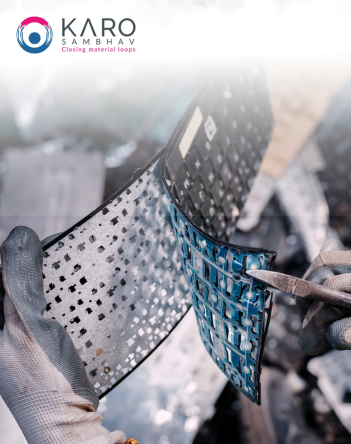Karo Sambhav collaborates with leading organisations to jointly develop industry frameworks, standards, governance mechanisms, systems and processes that advance the transition to circular economy. know more about our alliances.
Did you know that 95% of India’s electronic waste is recycled? Sounds quite like an accomplishment, right? Well, not really! Millions of tonnes of electronic junk are recycled by the informal and unauthorized sector under crude and unhealthy conditions. Such recycling sites are not just unsightly but incredibly unhygienic and unfavourable for survival. Besides, informal recycling fails to stand out as an effective electronic waste management solution. Here’s why:
In short, 95% of electronic waste, although recycled, is hardly any good. Wondering how to proceed with effective e-waste management? Implementing circular economy and responsible recycling of electronic waste is undeniably a need of the hour.
E-waste in India
India has always been an aspirational market. This quite explains the rapid growth of IT and communication hubs spanning the nooks and corners of the country. The increasing usage of electronic equipment and quick disposal of old and dated electronic products adds more to the growing e-waste stream every day. According to the reports last shared by the Central Pollution Control Board (CPCB), India witnesses a 31% annual growth in waste produced every year. Do you know the last recorded number? India is the 3rd largest contributor to the e-waste stream and generates over 32 lakh tonnes of electronic scrap annually. In addition to the fast-growing number, only a meagre 22.7% of the discarded electronics are rightfully collected, dismantled, treated, and disposed of by authorized recyclers.
What is the e-waste recycling capacity in India?
Disposing of dead and expired electronic equipment is more than just an environmental challenge. It is a major loss of secondary raw materials such as gold, copper, silver, and rare earth elements that end up stacking in landfills. Little do you know that the UN-powered Global E-waste Monitor describes e-waste dump yards as the ‘Urban Mine.’ Wondering why? Well, the mountains of electronic garbage here are rich in valuable and non-critical raw materials that can be upcycled and reused as secondary raw materials.
In view of the current e-waste scene, the need to introduce a well-thought waste management e-waste solution is more important than ever. Hence, the Government of India had assigned 472 authorized dismantlers and recyclers to collect, treat, and process electronic waste. Sadly, most recyclers have failed to utilise even 50% of their licensed capacity.
So, a stronger initiative and a robust new arrangement are much-needed to tackle the expanding e-waste ratios. Hence, laws to manage and curtail electronic waste have been put in place, also known as EPR solutions.
What is EPR?
Extended Producer Responsibility or EPR e-waste refers to an environmental policy approach mandating that only authorized and designated dismantlers and recyclers can collect and treat e-waste as per the norms. What’s more, the rule obligates PIBOs (Producers, Importers, and Brand Owners) to take back the electronic products that reach their end-of-life, refurbish, recycle, and treat the products in an environmentally-friendly approach.
The new rule intends to safely process the hazardous metals and chemicals found abundantly in the scrapped electronic equipment. Before explaining further, do you know how harmful electronic waste can be? Here’s why:
An electronic waste stream contains a sea of toxic components such as mercury, lead, cadmium, polybrominated flame retardants, zinc, chromium, and more. Not only are these compounds non-biodegradable but excessive exposure leads to lethal health conditions such as neurological problems, respiratory disorders, and more, especially in children.
Furthermore, EPR solutions are a producer-focused measure to reduce the creation of e-waste and lessen the dependency on the mining of raw materials. In addition to EPR, the concept of Producer Responsibility Organisation (PRO) was introduced to reinforce EPR. According to the EPR regulations, a producer is responsible for taking back and collecting electronic waste and ensuring that this waste reaches authorized dismantlers and recyclers. Karo Sambhav, a PRO in India, assists businesses and manufacturers in staying compliant with the EPR rules. The organisation hosts awareness programmes and initiatives to promote sustainable consumer habits to ensure better e-waste management in India.
Karo Sambhav collaborates with leading organisations to jointly develop industry frameworks, standards, governance mechanisms, systems and processes that advance the transition to circular economy. know more about our alliances.





